Veteran Furniture Makers Driven by “City of Wood” Program
One maker embraces professionalism and experience as key
2012/10/11 | By Michelle Hsu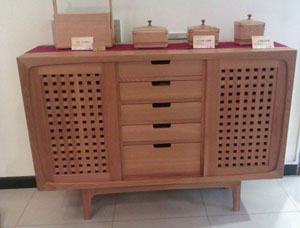
Japanese rulers adored the native Taiwanese cypress species meihili and hinoki, and felled ravenously such trees on Alishan (Mount Ali) in Chiayi to repatriate to Japan.
Chiayi's woodworking industry gradually dwindled due to governmental forest protection policy, which has not deterred some from crafting products mainly from reclaimed or imported woods, with few able to make products with local virgin lumber except those who can store wood in spacious backyards.
To encourage surviving woodworkers and reinvigorate the honorable wood craftsmanship of the city, Chiayi City Government sponsored two exhibitions this year, one in May and the other in July, to showcase works by various companies, also having invited government-backed consulting institutions as Taiwan Design Center (TDC) and China Productivity Center (CPC) to help map out directions amid the current business environment.
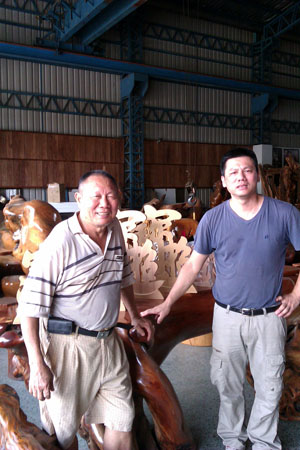
Shun Yi Wood Industry
Shun Yi Wood Industry, a wood furniture maker for over five decades, is one of the few with thousands of square meters of warehouse to store virgin precious Taiwanese woods as cypress, florin, sandalwood and so on, valuable assets that motivate Shun Yi to brainstorm strategies for transformation, primarily aiming to add a touch of modernity to its line and corporate image. Earlier, the company introduced the brand “Quan Hinoki Casa” for its furniture and wooden creations to suggest modernity and intricacy to shed the provincial stereotype of traditional Taiwanese wooden furniture. Unfortunately its brand manager seems to be shackled by the Taiwanese perspective that is sometimes rooted in Japanese colonialism, where even “new brands” don't announce cosmopolitan.
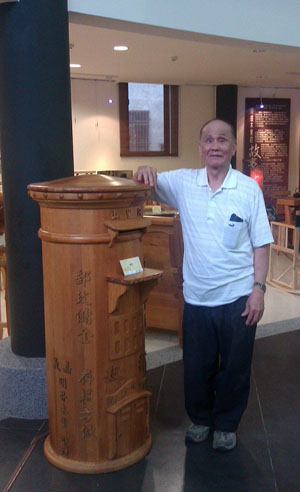
Taking TDC's suggestion, the company has been remodeling the decades-old plant into a tourist factory. The tourist factory is scheduled to be inaugurated next year to be the first in Chiayi, says Victor Yan, general manager. In fact, it is the second tourist furniture factory in Taiwan, with the first being Yung Shin Furniture Co. in Tainan, southern Taiwan.
Different from Yung Shin which combines a furniture museum and woodworking training to highlight oriental lifestyle, Shun Yi's tourist factory aims to mainly introduce the characteristics and values of indigenous Taiwanese woods.
Also a Tourist Site
Shun Yi's tourist factory is in line with Chiayi City Government's policy to build tourism in the city, which plans to revitalize architectural relics as the winery, railway village, Alishan forest village, and the centennial Chungshan Park as new tourist spots in the city.
Shun Yi's tourist factory is also framed on Yan's design talent and his father's experience in running a lumber business, both of whom were among the five persons honored during the wooden art exhibition held in May by Chiayi City Mayor for contributions to the city's woodworking industry.
Yan's father, in his early 70s, started in lumber distribution as a teenager. Original living in northern Taiwan, he moved to Chiayi to earn a living in the thriving lumber distribution business when Taiwan was still a poverty-stricken backwater. Never relocating since settling in Chiayi, he is renowned in the “City of Wood” for passion and professionalism, also a connoisseur of wood that helps with assessment of value of various species.
Having literally grown up in the industry, Yan has built broad knowledge of the nature, texture and characteristics of woods, having won from Chiayi City Government's award as a master of wooden furniture design.
One of the most amusing items displayed during the two shows this year was Yan's shoe cabinet that mimics the old-style Taiwanese TV set, featuring four legs and two-leaf door of high quality Taiwanese cypress. Seemingly an exercise in overkill, Yan explains that using cypress makes sense as the wood is naturally moisture-resistant and anti-bacterial.
Ming Sheng Wood Industry
Ming Sheng Wood Industry is another among the handful with its own inventory of lumber in Chiayi, but a different business model from Shun Yi, mainly filling custom orders for furniture, flooring, doors, windows, sundries, art objects, as well as architectural items for building restoration and repair.
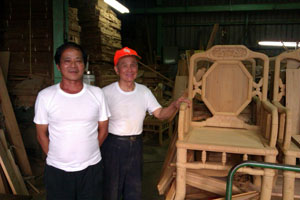
The free-standing mailbox is about 6 feet tall and crafted by the company's most experienced carpenter Tsai Chang-chin, in his early 80s, who received an award from Chiayi City Government this year for being a master of mortise and tenon technique applied in Chinese wooden furniture.
Tsai's boss, Lee Ming-shing, also was honored as a master of cypress craftsmanship. Taking over his father's firm, Lee knows inside out the value of precious Taiwanese woods and wastes not a single chunk. Large pieces are made into furniture and construction materials, with smaller pieces turned into chopsticks and woven into seat cover or pillow stuffing. Cypress chips are even extracted for essential oil that emits supposedly health-enhancing aroma.
Yixing Handmade Furniture
Tseng Cheng-yi, president of Yixing Handmade Furniture, also won an award as a master of integrated furniture supplier, offering material procurement, furniture design and production, and delivery. Originally Yixing Wood Industry founded by his father over 40 years ago, Yixing Handmade Furniture applies modern business management techniques amid the new age of scarce Taiwan-grown woods, when customers are more conscious of quality, design, and workmanship.
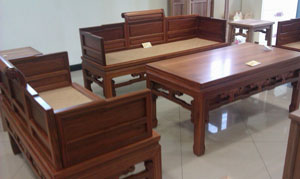
“We provide customized services to meet demand of any customer,” says Tseng, who is similar to most other second-generation operators in the wooden furniture business that grew up amid wood distribution to have cultivated a keen sense for wood. To Tseng, professionalism and experience are paramount assets to cope with business today where customers are fussy despite scant raw materials.




